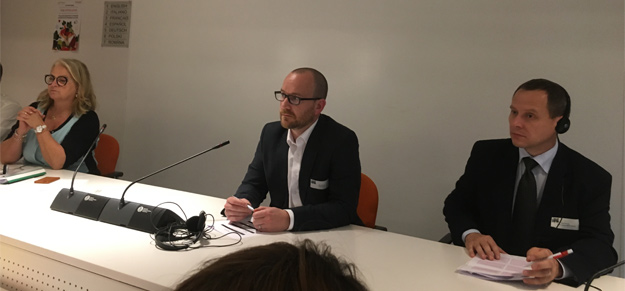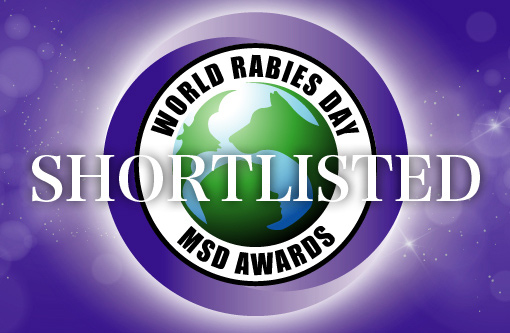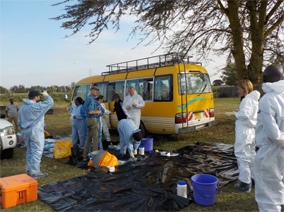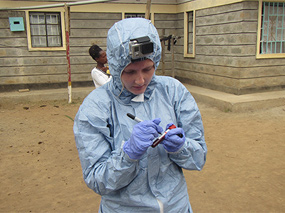Home \ Knowledge Hub \ Opinion \ Transboundary and Emerging Diseases – Preparing for the Unknown


01 Oct 2017
Transboundary and Emerging Diseases – Preparing for the Unknown
SHARE

ALASDAIR KING
Executive Director, International Veterinary Health
- Partners in Rabies Prevention (PRP) and PARACON
- Availability of animal health solutions for the future of livestock in Europe
- World Rabies Day Awards
- GALVmed
- USA road trip
- IVH presents on how pharmaceutical companies can help reduce the burden of emerging viruses
- Increasing awareness of lumpy skin disease and Lumpyvax in the Middle East
- EuFMD trainings on foot-and-mouth disease (FMD)
Despite the summer break, it’s been a busy time and we have been to a number of meetings around the world. Rabies and lumpy skin disease seem to be foremost in everyone’s minds but emerging diseases in general are causing a concern. The question of how we prepare ourselves for the unknown is a real issue, with new diseases affecting animals and humans. A One Health approach is essential, working together to find the solutions. As a major pharmaceutical company we are looking at what we can do over and above supplying high quality vaccines, and spending time talking to government and NGOs is critical to developing tools for the future.
Emerging diseases are causing a concern and the question is how to prepare for the unknown. We must focus on keeping animals healthy through the prevention of disease. We need sustainable programs for access to affordable medicines in developing countries to really improve animal and human health. We need One Health.
Partners in Rabies Prevention (PRP) and PARACON
There have been two key rabies meetings over the summer. The first was the PRP meeting in Switzerland, hosted by the UBS organization, bringing together key opinion leaders from the field of rabies control. The second was the Pan African Rabies Control Network conference (PARACON), organized by GARC, bringing together the Anglophone African governments. I was able to attend both of these. These were really positive and inspiring meetings, with everyone focusing on dog vaccination as the practical and cost-effective approach to stopping deaths in humans from rabies. The message for all is ‘Zero By 30‘, and represents a real determination to eliminate dog transmitted rabies by 2030.

Availability of animal health solutions for the future of livestock in Europe
John Atkinson attended and spoke at a workshop hosted by IFAH-Europe and Copa-Cogeca in Brussels. The meeting included representatives from stakeholder organisations, the European Commission, and Permanent Representatives. Discussions centered around three main topics (innovation, availability, preparedness) with perspectives on each topic given by farmers, the animal health industry, and other stakeholders (EMA, FVE, and FESASS). Speaking on behalf of IFAH-Europe, John Atkinson discussed the views of the animal health industry concerning Europe’s preparedness for animal disease outbreaks and, in particular, the issues surrounding access to veterinary medicinal products to tackle emerging and urgent threats. There was clear agreement that the future of livestock in Europe depends on keeping animals healthy through the prevention of disease, including the use of vaccines. The event was a great platform from which to build collaborative efforts to help secure a healthy future for Europe’s animals and the people who depend on them.

World Rabies Day Awards
On World Rabies Day (September 28th), with GARC, we announced the shortlisted nominees for the World Rabies Day Awards. We had over 80 individuals and organisations nominated for the amazing work they do towards the elimination of rabies. We are proud to sponsor these awards as these people deserve recognition for all their efforts. The shortlist now goes before the judging panel made up of WHO, OIE, FAO, CDC, and Merck. The final winners will be announced in November but, for now, here are the contenders:

Organisation – Sub-Saharan Africa: Veterinarians for Animal Welfare Zimbabwe, Zimbabwe; Have-a-Heart Mobile, Namibia; Lilingwe Society for the Protection and Care of Animals, Malawi
Organisation – Asia: Nowzad, Afghanistan; Kathmandu Animal Treatment Centre, Nepal; Society for the Advancement of Veterinary Education and Research, Philippines
Organisation – MEEREB: Kurdistan Organisation for Animal Rights Protection, Iraq; Protect Me, Albania
Organisation – Americas: Suvis Sao Miguel, Brazil; The Global Alliance for Animals and People, Chile; Santa Cruz de la Sierra, Bolivia
Individual – Sub-Saharan Africa: Mr Mawethu Kunyu, Transkei Animal Welfare Initiative, South Africa; Ms Sarah Schmidt, The Big Fix, Uganda; Dr Maryanne Kagai, Africa Network for Animal Welfare, Kenya
Individual – Asia: Dr Jack Reece, Help in Suffering, India; Mr Thy Buntha, Ouk Hok Sy Veterinary, Cambodia; Dr Rakesh Chand, Nepal
Individual – MEEREB: Mr Bojan Veselica, The Bark Ark, Bosnia & Herzegovina; Dr Shalala Zeynalova, State Veterinary Control Service, Azerbaijan; Dr Soumaya Ben Chehida, Municipalité de Tunis – Direction de la protection de l’environnement urbain, Tunisia
Individual – Americas: Ms Kelly Crowdis, Christian Veterinary Mission, Haiti; Dr Elena Garde, The Global Alliance for Animals and People, Chile; Dr Diodoro Batalla-Campero, Federación de Colegios y Asociaciones de Médicos Veterinarios Zootecnistas de México, A.C., Mexico
GALVmed
I attended the board meeting of the Global Alliance for Livestock Veterinary Medicines (GALVmed) just outside Edinburgh. The aim of GALVmed is ‘Protecting Livestock, Improving Human Lives’ and is focused on making medicines accessible and affordable in developing countries. We are all working on how to make this a sustainable programme, not reliant on donor money but instead building a complete chain. We need to look at improving the veterinary infrastructure, not simply placing products in the country, so that we improve both animal and human health. Again, it’s about One Health.

USA Road trip
In August I made the most of living in America by visiting a number of organisations in Boston, Washington, DC, and Seattle. We covered a lot of subjects, as well as a lot of distance—disaster relief and ensuring access to good quality medicines; supply chains in Africa; rabies in Latin America; temperature control of vaccines and thermotolerance; support for smallholders. All key areas that will be our focus over the next year.
Intergovernmental Veterinary Health (IVH) presents on how pharmaceutical companies can help reduce the burden of emerging viruses
John Atkinson was one of the speakers at the Emerging Viruses of Zoonotic and Veterinary Importance Conference in July, and looked at practical examples of how companies can respond and work with governments as partners in order to address the societal need of controlling emerging disease. The conference was held at Churchill College, Cambridge, and brought together international researchers with an interest in tackling emerging viruses that affect all species. The aim was to allow cross-fertilisation of ideas and common trends to be identified, as well as discussion of methodologies and prospects going forward.
Increasing awareness of lumpy skin disease and Lumpyvax in the Middle East
In response to the growing threat of lumpy skin disease in cattle throughout the region, John Atkinson spent time alongside the MSD Animal Health Middle East team in Jordan, Kuwait, and UAE during September. In meetings with officials, farmers, and vets, all aspects of lumpy skin disease were discussed with time spent understanding the particular situation faced in each country. These types of meetings and discussions are vital to ensure that awareness is raised about lumpy skin disease and that appropriate action is taken to control it, including vaccination with a high quality vaccine.

EuFMD trainings on foot-and-mouth disease (FMD)
The EuFMD provide some fantastic training on FMD. We spoke to them at the EuFMD General Session and felt that it would be good to let you know more about them. This is what they said:

“The European Commission for the Control of Foot-and-Mouth Disease (EuFMD) is a specialised commission of the Food and Agriculture Organisation of the United Nations and works to improve FMD preparedness in its 38 European Member States, promote improved FMD control in the European neighbourhood, and support progressive control of FMD globally. The EuFMD provide training related to all aspects of FMD preparedness and control. Their e-learning platform is free to join and hosts open access courses, in-depth tutored courses, regular webinars delivered through online networks, and the EuFMD Knowledge Bank, a database of resources and training tools. Alongside their library of e-learning resources, EuFMD also organise face-to-face training and workshops, including Real Time Training courses, an intensive course in which participants investigate outbreaks of FMD in countries where the disease is endemic, experiencing for themselves the real-life challenges in diagnosis and control of the disease.”


ALASDAIR KING
Executive Director, International Veterinary Health

